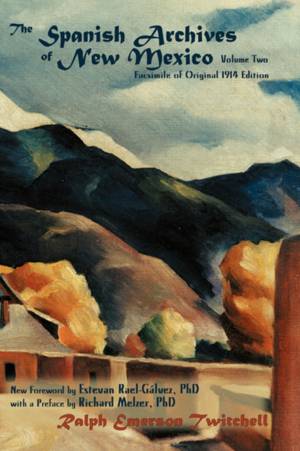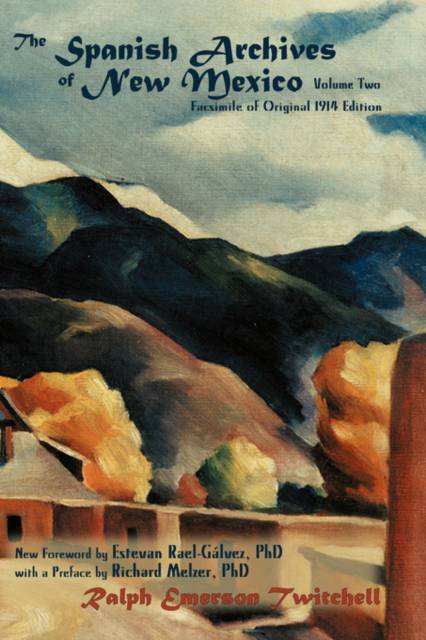
Door een staking bij bpost kan je online bestelling op dit moment iets langer onderweg zijn dan voorzien. Dringend iets nodig? Onze winkels ontvangen jou met open armen!
- Afhalen na 1 uur in een winkel met voorraad
- Gratis thuislevering in België vanaf € 30
- Ruim aanbod met 7 miljoen producten
Door een staking bij bpost kan je online bestelling op dit moment iets langer onderweg zijn dan voorzien. Dringend iets nodig? Onze winkels ontvangen jou met open armen!
- Afhalen na 1 uur in een winkel met voorraad
- Gratis thuislevering in België vanaf € 30
- Ruim aanbod met 7 miljoen producten
Zoeken
The Spanish Archives of New Mexico, Vol. Two (Hardcover)
Ralph Emerson Twitchell
€ 90,45
+ 180 punten
Omschrijving
In what follows can be found the doors to a house of words and stories. This house of words and stories is the Archive of New Mexico and the doors are each of the documents contained within it. Like any house, New Mexico's archive has a tale of its own origin and a complex history. Although its walls have changed many times, its doors and the encounters with those doors hold stories known and told and others not yet revealed. In the Archives, there are thousands of doors (4,481) that open to a time of kings and popes, of inquisition and revolution. "These archives," writes Ralph Emerson Twitchell, "are by far the most valuable and interesting of any in the Southwest." Many of these documents were given a number by Twitchell, small stickers that were appended to the first page of each document, an act of heresy to archivists and yet these stickers have now become part of the artifact. These are the doors that Ralph Emerson Twitchell opened at the dawn of the 20th century with a key that has served scholars, policy-makers, and activists for generations. In 1914 Twitchell published in two volumes The Spanish Archives of New Mexico, the first calendar and guide to the documents from the Spanish colonial period. Volume Two of the two volumes focuses on the Spanish Archives of New Mexico, Series II, or SANM II. These 3,087 documents consist of administrative, civil, military, and ecclesiastical records of the Spanish colonial government in New Mexico, 1621-1821. The materials span a broad range of subjects, revealing information about such topics as domestic relations, political intrigue, crime and punishment, material culture, the Camino Real, relations between Spanish settlers and indigenous peoples, the intrusion of Anglo-Americans, and the growing unrest that resulted in Mexico's independence from Spain in 1821. As is the case with Volume One, these documents tell many stories. They reflect, for example, the creation and maintenance of colonial society in New Mexico; itself founded upon the casting and construction of colonizing categories. Decisions made by popes, kings and viceroys thousands of miles away from New Mexico defined the lives of everyday citizens, as did the reports of governors and clergy sent back to their superiors. They represent the history of imperial power, conquest, and hegemony. Indeed, though the stories of indigenous people and women can be found in these documents, it may be fair to assume that not a single one of them was actually scripted by a woman or an American Indian during that time period. But there is another silence in this particular collection and series that is telling. Few pre-Revolt (1680) documents are contained in this collection. While the original colonial archive may well have contained thousands of documents that predate the European settlement of New Mexico in 1598, with the Pueblo Indian Revolt of 1680, all but four of those documents were destroyed. For historians, the tragedy cannot be calculated. Nevertheless, this absence and silence is important in its own right and is a part of the story, told and imagined. Let this effort and the key provided by Twitchell in his two volumes open the doors wide for knowledge to be useful today and tomorrow. --From the Foreword by Estevan Rael-Gálvez, New Mexico State Historian
Specificaties
Betrokkenen
- Auteur(s):
- Uitgeverij:
Inhoud
- Aantal bladzijden:
- 764
- Taal:
- Engels
- Reeks:
Eigenschappen
- Productcode (EAN):
- 9780865346840
- Verschijningsdatum:
- 1/07/2008
- Uitvoering:
- Hardcover
- Formaat:
- Genaaid
- Afmetingen:
- 156 mm x 234 mm
- Gewicht:
- 1238 g

Alleen bij Standaard Boekhandel
+ 180 punten op je klantenkaart van Standaard Boekhandel
Beoordelingen
We publiceren alleen reviews die voldoen aan de voorwaarden voor reviews. Bekijk onze voorwaarden voor reviews.











